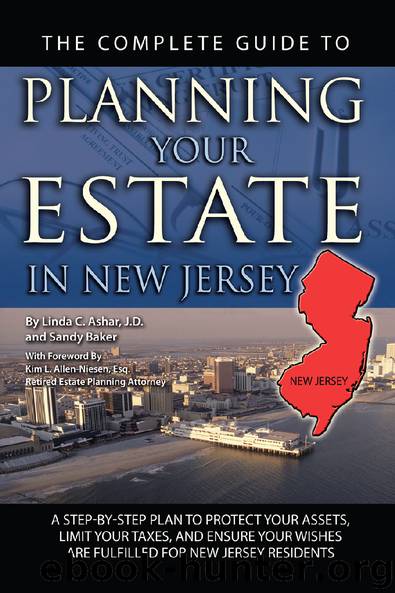The Complete Guide to Planning Your Estate In New Jersey: A Step-By-Step Plan to Protect Your Assets, Limit Your Taxes, and Ensure Your Wishes Are Fulfilled for New Jersey Residents by Linda C. Ashar

Author:Linda C. Ashar
Language: eng
Format: epub
Tags: estate, will, trust, assets, estate planning, disability, costs, taxes, legal costs, New Jersey, living will, power of attorney, executors, trustees, insurance
Publisher: Atlantic Publishing Group
Published: 2013-03-11T00:00:00+00:00
Making Your Trust Valid
One of the most important details for you to consider about a trust is whether the trust is valid. In the wording and the structure of the trust, you will need to set up and maintain this aspect. Again, working with your attorney is a must, if only for this reason alone. You should understand how a trust is set up so that it is valid and will do what you wish it to do.
Step 1: Preparing the documents
First, do not be fooled into thinking that there is a “one way is the only way” philosophy when it comes to creating a living trust document. The fact is, there is no legal form that must be used. Working with your attorney, you can create a simple form that will include what the document is and will define all the terms of the trust. All the important individuals whom we have talked about, from the trustor and the successor trustee down to the beneficiaries, need to be spelled out. You need to identify all your property in the trust and where it will go (and how) to your beneficiaries. Although no witnesses are required, you should have it notarized, which means signing the trust in front of a notary. It is imperative that you do have it notarized, rather than using bank guarantees or other options, as it is only official once it has been notarized.
Step 2: Transferring to the trustee
Next, you need to transfer the trust property into the trustee’s name. If you do not make this formal step, the successor trustee will not be able to perform his or her duties to the fullest. What this means is simply assigning your name to all documents in a specific format. It should read, “John Doe, as trustee for John Doe Trust” on the documents.
The property that will be placed into your trust that has a title or otherwise has legal paperwork that shows its ownership is the first type of property to make this change with. This includes your real estate; bank accounts; vehicles; safe deposit boxes; stocks and bonds; partnerships, including corporations and limited partnerships; mutual funds; and money market accounts. All these have a title or ownership papers that need to be transferred into the trustee’s name as we have described.
Some property does not have any such documentation for ownership. Your jewelry, household items, clothing, cash, and any other type of valuable property that you will be placing into your trust without documentation for ownership still need some additional note. To transfer these items into the trustee’s name, you will simply include them in a list format on your paperwork with a “Notice of Assignment” listed with them, which simply transfers ownership.
Step 3: Maintaining your trust over time
Just setting up your trust is not enough to keep it going. The trust is unique from most other forms of wills and substitutions because at any time, it can be revoked or otherwise changed to fit what is happening now in your life.
Download
This site does not store any files on its server. We only index and link to content provided by other sites. Please contact the content providers to delete copyright contents if any and email us, we'll remove relevant links or contents immediately.
| Estates & Trusts | International |
Working for Yourself by J.D. (Nolo) Stephen Fishman(1481)
The Secrets of Successful Financial Planning by Dan Gallagher(1177)
Working for Yourself by Stephen Fishman J.D. (Nolo)(1141)
Lower Your Taxes--BIG TIME! 2019-2020 by Sandy Botkin(1118)
American Bar Association Guide to Wills and Estates by American Bar Association(1000)
Treasure Islands by Nicholas Shaxson(993)
Plan Your Estate by Attorney Denis Clifford(989)
475 Tax Deductions for Businesses and Self-Employed Individuals by Bernard B. Kamoroff(987)
The Tax and Legal Playbook: Game-Changing Solutions to Your Small-Business Questions by Mark J. Kohler(969)
American Bar Association Guide to Wills and Estates, Fourth Edition: An Interactive Guide to Preparing Your Wills, Estates, Trusts, and Taxes by American Bar Association(965)
Basic International Corporate Taxation by Sebastiano Garufi(929)
How to Plan and Settle Estates by Edmund Fleming(927)
J.K. Lasser's Small Business Taxes 2013 by Barbara Weltman(909)
The Essential Executor's Handbook by David G. Hoffman(884)
Lower Your Taxes - BIG TIME! 2015 Edition: Wealth Building, Tax Reduction Secrets from an IRS Insider (Lower Your Taxes-Big Time) by Sandy Botkin(867)
Lincoln's Code by John Fabian Witt(848)
Treasure Islands: Dirty Money, Tax Havens and the Men Who Stole Your Cash by Nicholas Shaxson(830)
Lower Your Taxes - BIG TIME! 2017-2018 Edition: Wealth Building, Tax Reduction Secrets from an IRS Insider (Lower Your Taxes Big Time) by Botkin Sandy(814)
Estate Sales Made Easy by Victoria Gray(814)
